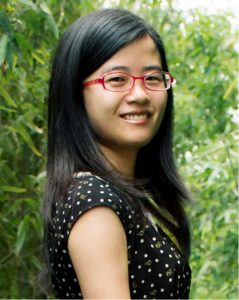
While working as an English elementary teacher in Guangzhou, Xiaoyan Zhang discovered her interest in the science of human development. “I directly observed the influence of parents’ characteristics, as well as family and school environment on children’s academic and behavioral development, and their relationship with parents,” says Zhang. “This experience intrigued my curiosity about the long-term impact of early environments on shaping one’s developmental process.”
Born and raised in southern China, Zhang decided to pursue graduate education at Syracuse University, studying human development and family science in Falk College for both her master’s and doctoral degrees.
As a Syracuse student, she dove into research work and this year was honored with a 2022 Graduate School Dean’s Award for Research Excellence for her study, “Loneliness and Depression Among American Older Adults: Can Resilience Resources be Buffers?” The award recognizes students across the university who have made outstanding accomplishments in research and creative work, as well as the quality and impact of their work.
We spoke with Zhang and asked her to share more about her research:
Q: What is your research study about?
A: My research focuses on the influences of childhood experiences (including both positive and negative, such as living in poverty and parental warmth) on individuals’ and their offspring’s development through two research lines: (1) whether and how childhood experiences influence the long-term development of mental health and well-being? (2) why are some people doing well despite experiencing adversity? I examine this research through the lens of modifiable relationship contexts.
Q: What is the possible long-term impact of new research/discoveries in this topic area?
A: I believe that with a better understanding of what amenable factors can buffer the developmental burdens resulting from early exposure to stressful environments could provide more effective targets for program development and policy initiatives for children, families, schools, and communities.
Q: Tell us about faculty mentorship at Falk College and Syracuse University.
A: I am fortunate to have Dr. Merril Silverstein as my doctoral advisor, who has provided me with invaluable mentoring in my academic journey. I admire his rich knowledge and expertise in aging in the context of intergenerational relations and methods for studying individual longitudinal data. I learned a lot from our intellectual interactions.
Also, I am very grateful for the opportunity of working as a Lerner Graduate Fellow at the Lerner Center for Public Health Promotion since 2019 under the advisement of Dr. Shannon Monnat. This opportunity has helped me develop a broad perspective on healthy development across the life course.
Lastly, I want to credit my professional growth to my coursework professors (mainly from Falk College), senior coauthors, and scholars I meet at the conferences, family and friends.
Q: Besides your research work, what is one of your favorite things to be involved in at Syracuse?
A: When I was completing my master’s training at SU, I worked as a teaching assistant in the Bernice M. Wright (BMW) Child Development Laboratory School. I still remember how intellectually stimulating and fascinating it was when the concepts I learned in class unfolded in front of my eyes.
The BMW Lab School is one of Syracuse University’s early childhood education programs, which provide high-quality, developmentally appropriate, inclusive full-day care to children.
Learn more information about human development and family science, and student research at Falk College.
